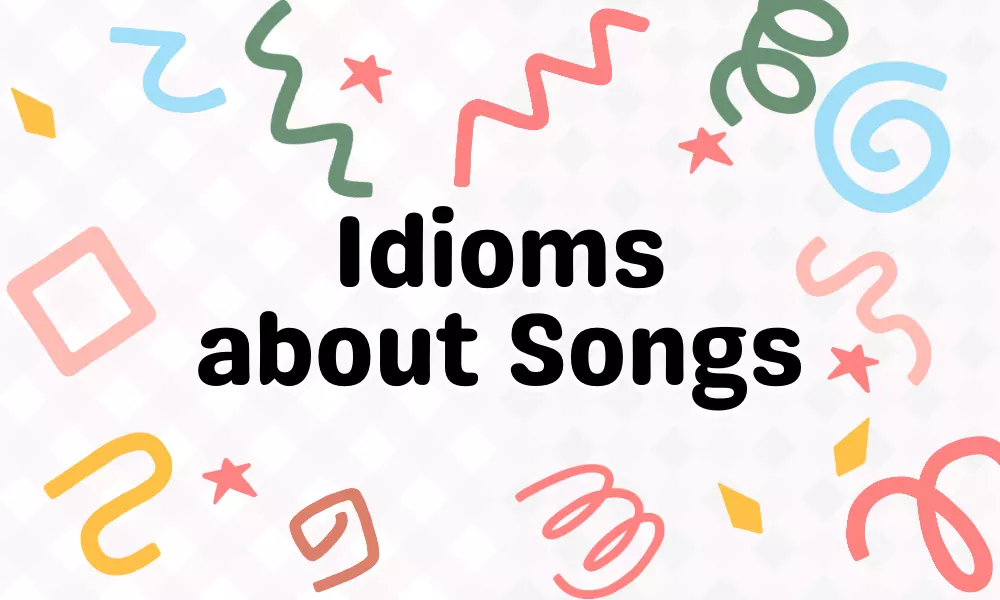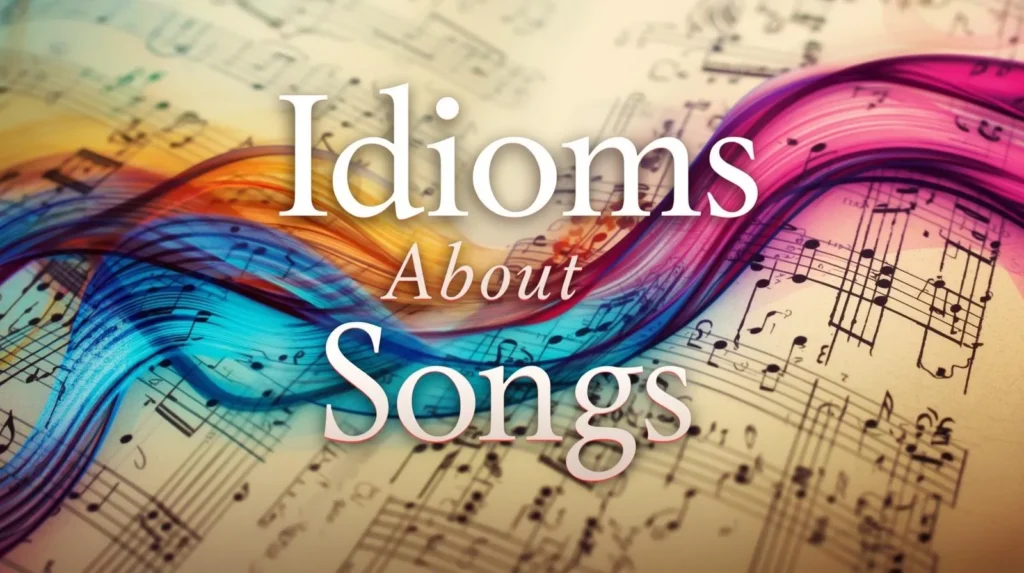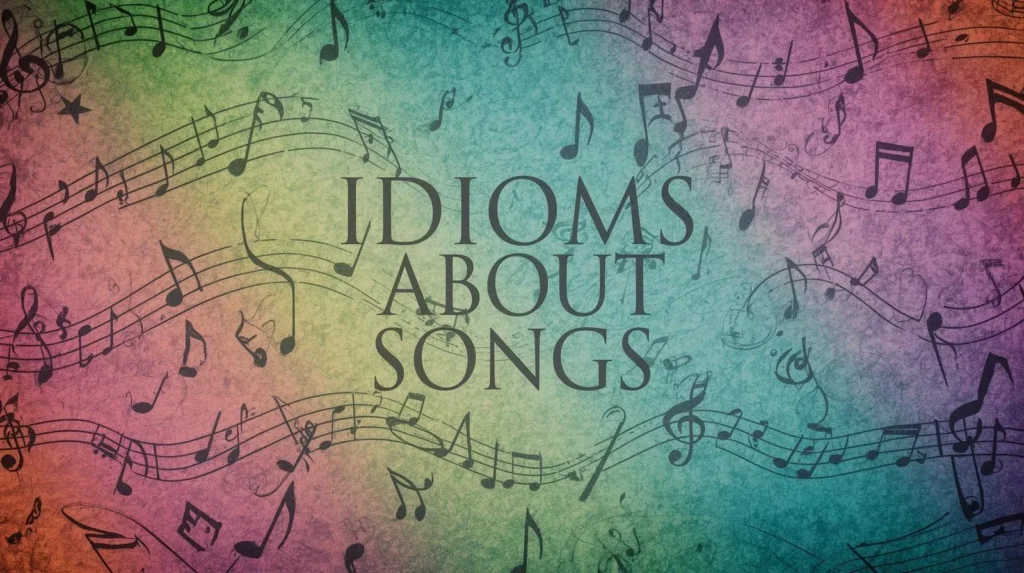Idioms About Songs – Meanings, Examples and Usage in English

Music speaks a universal language, one that transcends words and resonates with emotion. But beyond melodies and rhythms, music has also shaped the way we speak. Many everyday expressions draw inspiration from it, creating idioms that add rhythm, depth, and color to our language. From “face the music” to “music to my ears,” these phrases capture emotions and experiences in a way that simple words cannot.
What Are Idioms About Songs?
Idioms about songs are expressions or phrases that use musical terms to convey deeper, non-literal meanings. They don’t actually refer to singing or music itself, but instead use it as a metaphor to describe emotions, actions, or situations in everyday life. For example, saying “it’s music to my ears” means something is pleasant to hear, not that someone is literally listening to music. These idioms bring creativity and rhythm to language, helping people express ideas in a more vivid and relatable way.

Commonly Used Idioms For Songs With Meaning And Example
- Face the music
Meaning: Accept the unpleasant results of your actions.
Example: He knew he’d made a mistake, so he decided to face the music and apologize. - Music to my ears
Meaning: Something that’s very pleasant to hear or learn.
Example: The news of my promotion was music to my ears. - Play it by ear
Meaning: To act without planning; to improvise.
Example: We didn’t make a plan for the day, let’s just play it by ear. - Change your tune
Meaning: To change one’s opinion or attitude.
Example: She changed her tune after realizing how hard the job really was. - Blow your own trumpet
Meaning: To boast or brag about oneself.
Example: He’s always blowing his own trumpet about his achievements. - Strike the right chord
Meaning: To do something that creates a positive emotional response.
Example: His kind words struck the right chord with everyone. - Sing someone’s praises
Meaning: To speak very highly of someone.
Example: The teacher sang her student’s praises during the award ceremony. - Play second fiddle
Meaning: To take a subordinate role to someone else.
Example: He didn’t like playing second fiddle to his younger brother. - In tune
Meaning: In harmony or agreement.
Example: The team worked perfectly in tune with each other. - Out of tune
Meaning: Not in harmony; disagreeing or not fitting well.
Example: Their opinions were completely out of tune during the meeting. - Dance to someone’s tune
Meaning: To do what someone else wants.
Example: He’s always dancing to his boss’s tune. - Sing a different tune
Meaning: To change one’s opinion or behavior completely.
Example: Once he saw the evidence, he started singing a different tune. - It ain’t over till the fat lady sings
Meaning: Don’t assume something is finished until it’s truly over.
Example: We still have time to win, remember, it ain’t over till the fat lady sings. - Call the tune
Meaning: To be in control; to make the decisions.
Example: In this company, the CEO calls the tune. - As clear as a bell
Meaning: Very clear and easy to understand or hear.
Example: Her voice was as clear as a bell during the performance. - Make a song and dance about it
Meaning: To make an unnecessary fuss about something.
Example: He made a song and dance about not getting invited. - March to the beat of your own drum
Meaning: To do things your own way, not following others.
Example: She’s always marched to the beat of her own drum. - Whistle in the dark
Meaning: To pretend to be brave or optimistic when you’re actually afraid.
Example: He was just whistling in the dark when he said he wasn’t nervous. - Fine-tune
Meaning: To make small adjustments for improvement.
Example: We need to fine-tune our strategy before launching the product. - Sing from the same hymn sheet
Meaning: To agree and speak consistently with others.
Example: The managers are finally singing from the same hymn sheet. - Blow the whistle
Meaning: To report wrongdoing or illegal activity.
Example: The employee blew the whistle on the company’s fraud. - Ring a bell
Meaning: To sound familiar.
Example: That name rings a bell, but I can’t remember where I heard it. - Hit the right note
Meaning: To achieve the desired effect or response.
Example: His speech really hit the right note with the audience. - Play by the rules
Meaning: To follow the established rules or norms.
Example: In this competition, everyone has to play by the rules. - Sound like a broken record
Meaning: To repeat the same thing over and over again.
Example: You sound like a broken record complaining about your job. - Music to someone’s ears
Meaning: Words or news that make someone very happy.
Example: Hearing that the project was approved was music to my ears. - Sing the blues
Meaning: To complain or feel sad about something.
Example: He’s been singing the blues since his team lost the match. - Play the same tune
Meaning: To repeat the same argument or opinion.
Example: They keep playing the same tune about budget cuts. - Drum up support
Meaning: To try to get more people to support something.
Example: The group is drumming up support for the new policy. - Blow off steam
Meaning: To release pent-up emotions or energy.
Example: After work, he plays guitar to blow off steam. - Like a broken record
Meaning: Someone who keeps saying the same thing repeatedly.
Example: My mom sounds like a broken record reminding me to clean my room. - Make sweet music together
Meaning: To work or get along very well with someone.
Example: The new partners make sweet music together in business. - Strike up a tune
Meaning: To start playing or singing music.
Example: The band struck up a tune as the crowd cheered. - Sound off
Meaning: To express an opinion loudly or freely.
Example: He sounded off about how unfair the system was. - Jam session
Meaning: An informal gathering of musicians playing together.
Example: We had a jam session at my friend’s house last night. - Keep in tune with
Meaning: To stay connected or updated with something.
Example: It’s important to keep in tune with current trends. - Carry a tune
Meaning: To be able to sing well.
Example: She can’t carry a tune, but she loves karaoke. - Play your cards right
Meaning: To act wisely to achieve success.
Example: If you play your cards right, you’ll get that promotion. - Sing your heart out
Meaning: To sing with great passion and emotion.
Example: She sang her heart out during the competition. - Toe the line
Meaning: To conform to the rules or expectations.
Example: Employees are expected to toe the line at all times. - In harmony
Meaning: To work well together or be in agreement.
Example: The committee worked in harmony to finish the project. - Offbeat
Meaning: Unusual or unconventional.
Example: He has an offbeat sense of humor that everyone loves. - Beat the drum for something
Meaning: To actively support or promote something.
Example: She’s been beating the drum for women’s rights for years. - Pull out all the stops
Meaning: To do everything possible to achieve success.
Example: They pulled out all the stops for their anniversary concert. - Upbeat
Meaning: Cheerful and optimistic.
Example: He’s always so upbeat, even when things go wrong. - Chime in
Meaning: To join in or add to a conversation.
Example: Feel free to chime in if you have any ideas. - Set the tone
Meaning: To establish the mood or attitude for something.
Example: The manager’s opening remarks set the tone for the meeting. - Play along
Meaning: To cooperate or pretend to agree.
Example: She didn’t like the idea but decided to play along. - Hit the high notes
Meaning: To achieve great success or reach an impressive point.
Example: The company hit the high notes with its latest product launch. - Strike a chord
Meaning: To resonate emotionally with someone.
Example: Her story struck a chord with everyone in the audience.
Rare and Unique Idioms About Songs
- Sing for your supper
Meaning: To earn what you receive by giving something in return.
Example: Artists often have to sing for their supper at small gigs. - Dance to a different tune
Meaning: To behave differently from usual.
Example: After the warning, he began dancing to a different tune. - Sing small
Meaning: To act modestly after being boastful.
Example: He was bragging before, but now he’s singing small. - Fiddle while Rome burns
Meaning: To ignore serious problems while doing trivial things.
Example: The manager is fiddling while Rome burns instead of fixing the issue. - Song and dance routine
Meaning: A complicated explanation to avoid telling the truth.
Example: He gave me a song and dance routine about why he was late. - Sing like a canary
Meaning: To confess or reveal secrets.
Example: The suspect finally sang like a canary after hours of questioning. - Tuned in
Meaning: To be aware or attentive.
Example: She’s really tuned in to the needs of her students. - Blow your pipes
Meaning: To sing loudly or powerfully.
Example: The singer blew her pipes out during the concert. - Whistle-stop tour
Meaning: A quick tour with brief visits to many places.
Example: The politician went on a whistle-stop tour of the region. - Play the same old song
Meaning: To repeat the same excuses or complaints.
Example: He’s playing the same old song about being too busy.
Read: Idioms For Joy
Songs Idioms in Literature and Pop Culture
- Face the Music
Meaning: To accept the consequences of one’s actions.
Example: In many classic novels and films, characters must “face the music” after making poor decisions like Jay Gatsby confronting the truth in - The Great Gatsby. Blow Your Own Trumpet
Meaning: To boast or talk proudly about oneself.
Example: In British literature and TV, this idiom is often used humorously, characters like Mr. Collins in Pride and Prejudice loves to blow their own trumpet. - It Ain’t Over Till the Fat Lady Sings
Meaning: Don’t assume something is finished until the final moment.
Example: Popularized in sports commentary and films, this phrase appears in The Simpsons and Spaceballs, symbolizing persistence and hope. - Sing the Blues
Meaning: To express sadness or sorrow.
Example: The phrase comes from blues music and appears in countless songs, such as Elton John’s I Guess That’s Why They Call It the Blues, symbolizing heartbreak or emotional struggle. - March to the Beat of Your Own Drum
Meaning: To live or act according to your own rules.
Example: In movies like Dead Poets Society, this idiom represents individuality and courage to be different. - Like a Broken Record
Meaning: To repeat the same thing over and over again.
Example: Commonly used in modern TV shows and comedies, such as Friends, when characters repeat complaints or habits endlessly. - Ring a Bell
Meaning: To sound familiar or vaguely recognizable.
Example: In mystery and detective stories like Sherlock Holmes, detectives often use this idiom when a clue “rings a bell.” - Pull Out All the Stops
Meaning: To do everything possible to achieve success.
Example: Originating from organ music, it’s used in films like The Greatest Showman to describe giving one’s full effort in a performance or project. - Strike a Chord
Meaning: To create an emotional connection or strong reaction.
Example: In literature and film reviews, critics often say a story “strikes a chord” with audiences because it touches deep emotions. - Play It by Ear
Meaning: To act without a plan; to improvise.
Example: In comedies and adventure movies, this idiom is used when characters make spontaneous decisions like Indiana Jones often having to “play it by ear” in chaotic situations.

Synonyms and Alternatives For Songs
| Synonym | Meaning |
|---|---|
| Melody | A sequence of musical notes that sound pleasing together; often represents harmony or flow in language. |
| Tune | A simple musical composition; can symbolize mood or tone in communication. |
| Harmony | The combination of different sounds or voices in agreement; often used metaphorically for unity or balance. |
| Rhythm | The pattern of beats or movement in music; in language, it refers to the flow or pacing of words. |
| Chorus | A repeated part of a song; can mean repetition or collective voice in speech or writing. |
| Ballad | A slow, emotional song telling a story; metaphorically used for nostalgic or romantic storytelling. |
| Anthem | A powerful, inspiring song representing a group or cause; symbolizes pride or motivation. |
| Lullaby | A soothing song used to calm or comfort; often symbolizes peace or emotional gentleness. |
| Serenade | A romantic or affectionate song performed for someone; represents admiration or love in figurative language. |
| Jingle | A catchy short song or tune, usually for ads; symbolizes something memorable or attention-grabbing in speech. |
Tips for Using SongsIdioms in Writing and Speech
- Match the Mood:
Choose song idioms that reflect the emotion or tone of your message, use “music to my ears” for joy or “sing the blues” for sadness. - Blend Naturally:
Integrate idioms smoothly within sentences so they sound natural, not forced. Avoid overloading your writing with too many musical phrases. - Use for Imagery:
Song idioms add rhythm and vividness. For example, “strike the right chord” paints a clearer emotional image than “make someone happy.” - Reflect Personality:
Idioms like “march to the beat of your own drum” can show individuality or independence in a character or speaker’s voice. - Adapt for Creativity:
You can twist common idioms to create fresh expressions like saying “remix the tune” instead of “change your tune” for a modern touch.
Read: Idioms For Death
Read: Idioms For Costumes
FAQs
Conclusion
Songs and music idioms bring language to life with rhythm, feeling, and expression. They don’t just make our speech sound poetic, they help us communicate emotions and ideas in a more creative and relatable way. Whether you’re saying “face the music,” “strike a chord,” or “music to my ears,” each phrase adds melody and meaning to your words. By understanding and using song idioms, writers, students, and English learners can enrich their vocabulary and make everyday communication sound more natural and engaging.
